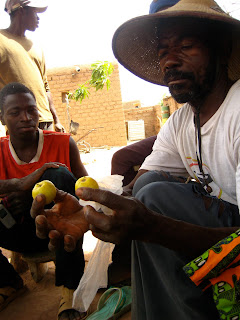Between quarterly reports, responding to letters from home about what I actually spend my time doing and the constant conversations with other Americans about our effectiveness as volunteers I spend a lot of time evaluating my Peace Corps work in Mali. I ask questions such as: What work am I producing? How many more meetings can we have about trees and shea butter? How will I truly leave a mark on my village? It is easy to get caught up in questions like this; questions that while necessary for reports sent to Washington sorely miss the mark on evaluating my Peace Corps service from the perspective of the people to whom my time here means most - Malians.
On Friday morning Sidiki Coulibaly arrived in our compound in a wax-fabric boubou with a white, embroidered skull cap perched on his head in lieu of a helmet. A black crate strapped to the back of his bicycle containing three saplings (grafted crab apple, mango and shea) let me know this was not just another cute old man passing by to visit his buddies in a neighboring quartier - this was Sidiki, tree expert extraordinaire, here to talk with us about trees! After persistent conversations about desertification, firewood and rainfall my host dad, Esayi, called Sidiki to come to our village and teach a group of 25 men interested in starting their own tree nurseries the basics of sapling care and tree grafting.

Sidiki talks about grafted crab apple trees
 Sidiki's hand dug well - over 20 meters deep! He has a pump that connects at the bottom of this stairwell (and the beginning of where water rises) to water his tree orchard
Sidiki's hand dug well - over 20 meters deep! He has a pump that connects at the bottom of this stairwell (and the beginning of where water rises) to water his tree orchard The water gets pumped up the stairwell (in a tube) and into this cistern and then out again through the hoses connected at the base. Pretty cool!
The water gets pumped up the stairwell (in a tube) and into this cistern and then out again through the hoses connected at the base. Pretty cool!At the end of Sidiki's talk the twenty-five men who attended the meeting alternately blessed Sidiki and his work and then me for working with Esayi to get Sidiki to pass on some of his tree expertise. I asked Sidiki to share his story of how he got started in the tree business with the men as a way of reinforcing the 'dooni dooni' (small, small) element of tree work and also to remind myself the impact one toubab can have. Looking at Sidiki, head tilted back on his green plastic chair and a smile on his lips as he reflected on Mamou Koné, I captured a fleeting feeling of what will truly mark the success or failure of my time in Mali. While projects and relationships are inevitably intertwined, Sidiki's crinkled eyes and gentle smile were not from thinking about all the hard work Mamou did as a volunteer. The reverent way he said 'Ah, Mamou, muso-sebe ba don!' (rough translation: That Mamou is one hell of a woman!) was not because of the hours, weeks and possibly months she spent planning the tree conference in San. For the success of a Peace Corps service in Mali, from a Malian point of view, is measured not in bags of cement or trees planted but in the relationships we build and the lasting impressions a genuine person can have. I can only hope that one day when toubabs or America are brought up Annie and Esayi, two Malians that matter the most to me, will pull out their prized photo album, turn to my picture slid in between torn plastic-sheet protectors and, with their heads tilted on the backs of their plastic string chairs, say, 'Ah, Djelika, muso-sebe ba don!'
Dramane shows off two grafted crab apples
Sidiki demonstrates how to graft trees with some neem tree branches



2 comments:
Great blog! Love hearing from you more. I am Jane from Philippines, a postcard enthusiast and love learning the different cultures, languages and norms. I have a Postcard Project called “Postcard 100″ Would love you to participate. Hugs Jane
http://enajpostcards.blogspot.com
this post reminds me of a documentary i saw last semester...it's called Taking Root: The Vision of Wangari Maathai. look it up sometime! and if i can get my copy back from my friend to whom i lent it, i'll send it to Mali!
Post a Comment